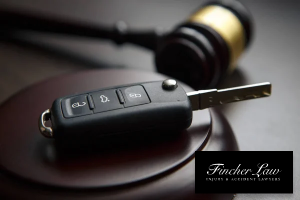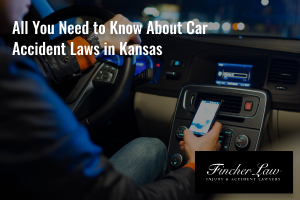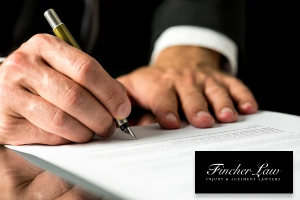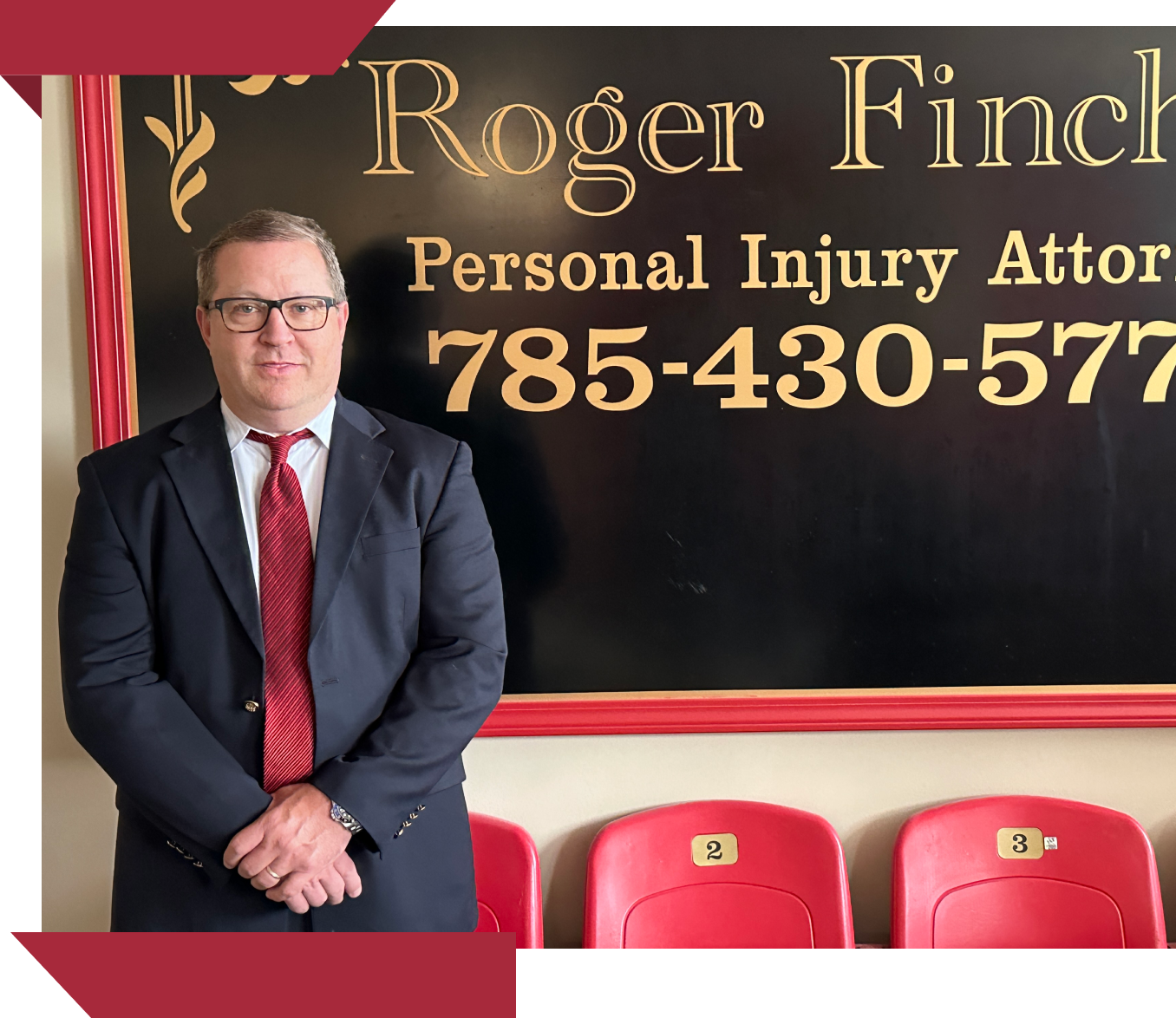
Car accidents in Kansas can be complex and stressful, and understanding the laws governing them is crucial. These laws cover various topics, from what to do immediately after an accident to the legal proceedings that may follow. Knowing your rights and responsibilities can significantly impact the outcome of any accident-related issues.
At Fincher Law, we can help you with your own insurance company after a car crash. Our experienced personal injury lawyer can also help you pursue personal injury claims that could cover your medical bills. Let us help you get the settlement you deserve.
Learn more about how these laws impact your car accident claim. Then, contact us for help pursuing car accident compensation from the at-fault driver.

In Kansas, car accident laws are comprehensive, covering everything from distracted driving to insurance requirements. These laws aim to reduce accidents and ensure fair handling of the aftermath. Understanding these laws helps make informed decisions, whether driving day-to-day or dealing with the aftermath of an accident. Staying informed about these laws is crucial for all Kansas drivers.
Kansas takes distracted driving seriously, with laws specifically targeting this behavior. Disturbed driving includes any activity that detracts attention from the act of driving, such as texting or talking on the phone. Penalties for distracted driving can consist of fines and, in severe cases, points on your driving record. It's important to note that these laws are in place for your safety and the safety of others on the road.
In Kansas, seat belt use is mandatory for all drivers and front-seat passengers, and children must use appropriate car seats and restraints. This law is enforced through primary enforcement, which implies that you can be pulled over exclusively for not wearing a seat belt. The fines for seat belt violations may seem small, but the true cost stems from an elevated risk of serious injury or fatality in an accident. Wearing your seat belt is a simple yet effective way to protect yourself and your passengers.
Kansas has a Graduated Driver Licensing (GDL) program to reduce accidents among new drivers. This program includes several stages: an instructional permit, a restricted license, and a full license. Each stage has specific requirements and restrictions, like supervised driving hours and limits on driving times or passenger numbers. The GDL program is designed to allow new drivers to gain experience under safer conditions.
Kansas traffic laws play a crucial role in maintaining safety on the roads.
Speed limits in Kansas vary depending on the type of road and area. Abiding by these limits is crucial, as speed is a significant factor in both the likelihood and severity of accidents. Exceeding the speed limit enhances the probability of a collision and can lead to fines and points on your driving record.
Compliance with traffic signals and signs is essential for safe driving in Kansas. Ignoring these signals, like running a red light or a stop sign, can lead to serious accidents. Penalties for non-compliance can include fines and points on your driving record. It's important to always pay attention to and follow traffic signals and signs.
Understanding and adhering to right-of-way rules is vital for preventing accidents. These rules dictate who has the right to go first in different driving scenarios, like at four-way stops or when merging onto a highway. Not yielding the right-of-way can lead to collisions, a common cause of traffic disputes and accidents in Kansas. Always be aware of these rules and respect other drivers' right-of-way to ensure safety on the road.
Reckless driving in Kansas, defined as driving with a willful or callous disregard for the safety of others, is a severe offense. It can include behaviors like excessive speeding, aggressive driving, or illegal maneuvers. Penalties for reckless driving can be severe. They could include fines, license suspension, and even jail time. It's essential to drive responsibly and consider the safety of all road users.

Kansas operates under a no-fault car insurance system, which affects how insurance claims are handled after an accident. A few key points about our no-fault state include:
Personal Injury Protection (PIP) coverage is a mandatory part of all auto insurance policies in Kansas. It covers medical expenses, lost wages, and other out-of-pocket costs, irrespective of fault for the accident. This coverage ensures that individuals receive prompt medical attention without the need for lengthy legal battles over liability. However, PIP will not cover property damage or pain and suffering.
While the no-fault system simplifies many accident claims, there are exceptions. You may step outside the no-fault system if injuries reach a certain severity or if damages exceed a specified threshold. In these cases, you can submit a claim against the insurance of the driver at fault or initiate a lawsuit for extra compensation. Understanding these exceptions is crucial for anyone involved in a severe car accident in Kansas.
Kansas follows the rule of comparative fault in car accident cases, which affects how damages are awarded. In comparative fault, each party's responsibility for the accident is determined, and damages are awarded accordingly. If you are found partly at fault for the crash, your compensation will be slashed by your percentage of fault. For instance, If you carry 20% of the fault, your compensation will be diminished by 20%. This system aims to distribute damages fairly based on each party's responsibility.
However, if you are found to be 50% or more at fault, you cannot recover any damages. This "modified" comparative fault rule emphasizes proving the other party's fault in a car accident case. Understanding how fault is determined is crucial in these legal proceedings.
Knowing the right steps to take after a car accident in Kansas can significantly affect the outcome of any legal or insurance proceedings.

Kansas law requires all drivers to have certain minimum levels of auto insurance coverage. This is to guarantee that drivers have some financial safeguard in case of an accident.
The minimum coverage limits in Kansas cover bodily injury and property damage. These include $25,000 per person, $50,000 per crash in the case of bodily injury, and $25,000 for property damage. These minimums are designed to provide basic protection, but higher coverage limits are often recommended for better protection.
Uninsured/underinsured motorist coverage is a key aspect of Kansas auto insurance. This coverage ensures your protection if you encounter an accident with an uninsured driver or insufficient insurance. In Kansas, this coverage is required and must match the bodily injury limits of your policy.
In Kansas, no-fault insurance, or Personal Injury Protection (PIP), is mandatory for auto insurance. This coverage pays for medical costs, rehabilitation expenses, lost wages, and other necessary expenses, regardless of who caused the accident. PIP coverage provides immediate financial assistance for catastrophic injuries without the need to establish fault.
In Kansas, certain accidents must be reported to the authorities. If an accident results in injury, death, or significant property damage, immediate reporting to the police is required. This can be done at the accident scene or as soon as possible afterward. The police report generated is essential for insurance claims and legal proceedings.
The statute of limitations is a vital legal concept to understand in the context of car accidents in Kansas. Kansas law sets a deadline for filing a lawsuit related to a car accident. From the date of the accident, you have two years to file a lawsuit. For property damage, the limit is also two years.
In Kansas, car accident victims may be eligible for various types of damages.
Economic damages cover tangible losses like medical expenses, lost wages, and property damage. These are calculable costs resulting from the accident. They aim to restore the victim to their financial position before the accident.
Non-economic damages cover losses that are intangible in nature, such as emotional trauma, pain, suffering, and loss of enjoyment in life. They recognize the non-financial impact of an accident on a victim's life.
When facing a car accident lawsuit in Kansas, common defenses may be used.
Contributory negligence involves arguing that the plaintiff was also at fault for the accident. Under Kansas's comparative fault system, if the plaintiff is found partly responsible, their compensation can be reduced proportionally. They cannot recover damages if they are found 50% or more at fault.
Assumption of risk is a defense where it's argued that the plaintiff knowingly engaged in an activity with inherent risks. For example, if a passenger knowingly gets into a car with an intoxicated driver, they may be seen as having assumed the risk. This defense can be complex and depends on each case's specific circumstances.

If you've been involved in a car accident in Kansas, navigating the legal landscape can be daunting. Our team at Fincher Law Injury & Accident Lawyers is here to help, and we have a long track record of successful case results.
Contact us to schedule a free case consultation.



How Can We Help You?
How Can We
Help You?
Schedule a Free Consultation Now By Contacting
Our Team at (785) 430-5770 or by completing the form below
Schedule a Free Consultation Now
By Contacting Our Team
at (785) 430-5770
"*" indicates required fields